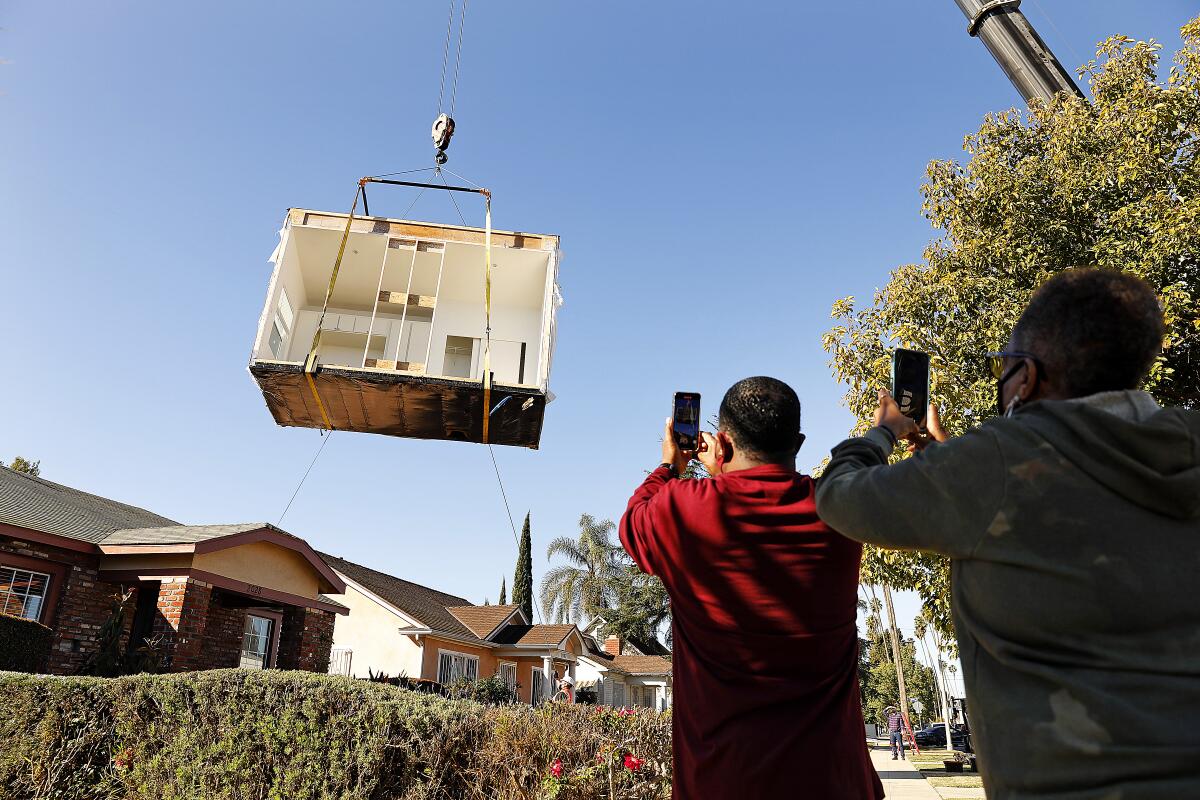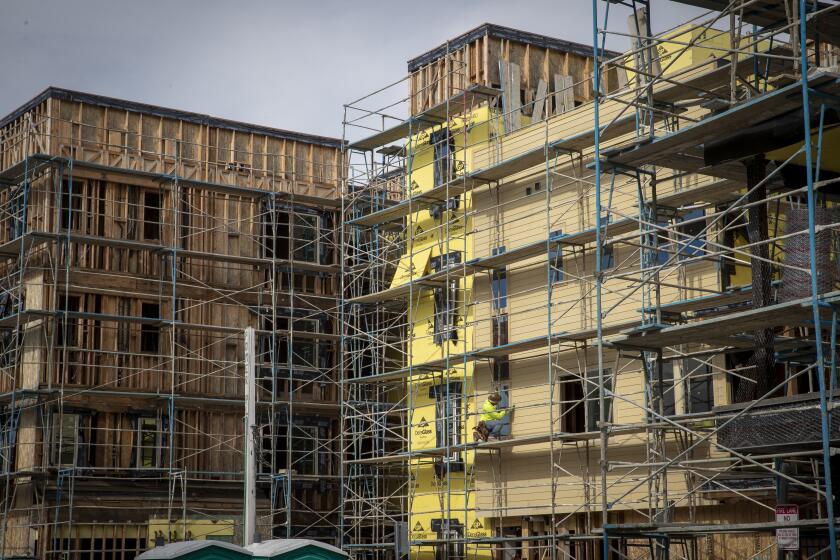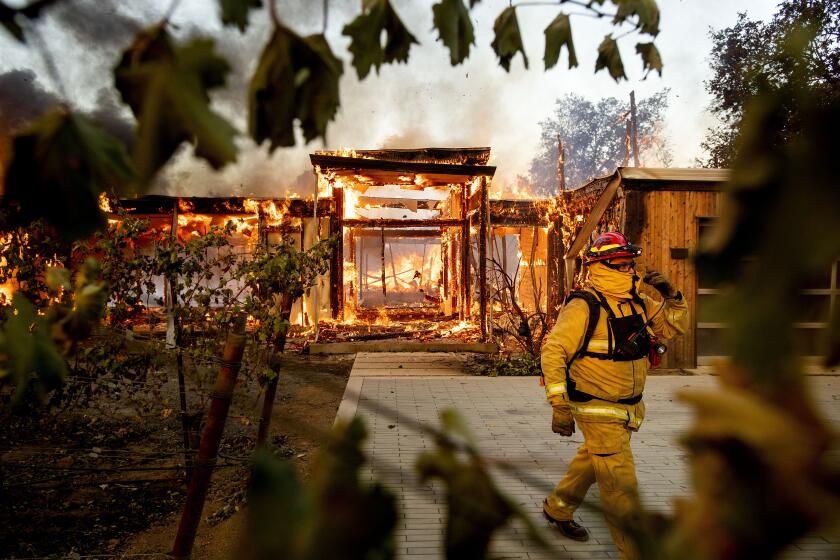California has so many new housing laws. Now let’s put them to use

- Share via
Could 2023 be the sleeper year for solving California’s housing crisis? This week Gov. Gavin Newsom signed a whopping 56 bills designed to streamline housing construction and protect tenants.
There were few blockbuster bills, at least compared to previous years when California ended single-family zoning or allowed the conversion of offices and shopping centers into housing. Rather, lawmakers passed dozens of under-the-radar policy changes that, in total, are expected to have a big impact over time by making it easier to build more apartments, affordable housing and accessory dwelling units.
There are no silver bullets in fixing California’s housing shortage. Instead it will take lots of small changes to laws and codes to allow more homes.
That’s important. California’s housing shortage was created over decades by a panoply of state and local regulations, some designed to slow growth and home construction. The state is now paying the price — the population increased but housing supply didn’t keep up, driving rents and home prices to record levels. Now legislators, housing advocates and some local government leaders are trying to identify those hurdles and remove them, bill by bill.
Bills signed into law by Newsom target key housing reforms, including making it easier to convert existing commercial or industrial buildings into housing, rethinking staircase requirements to encourage construction of small apartment buildings on narrow lots, and letting developers build bigger projects if they include low-income units, plus additional moderate-income units.
Editorial: Turning office buildings into apartments is how California eases the housing crisis
State and local governments are finally moving out the way so that moribund strip malls and high-rise towers can be converted into desperately needed apartments, condos and townhomes.
Several of the newly signed bills will increase the state’s power to enforce existing laws on recalcitrant cities that refuse to make room for more homes. That’s important too; for decades California has had toothless housing laws on the books that were largely ignored or unenforceable.
And legislators, again, worked on easing construction of ADUs. These backyard homes have become a demonstration of how state laws that override local restrictions can lead to a building boom. Nearly 45,000 ADUs have been completed since 2018, when ADU streamlining laws began taking effect. Bills signed into law this year will bar local jurisdictions from requiring that property owners live on the property of their ADUs and will allow cities to decide whether ADUs can be sold separately from the main house, which could result in more entry-level homes on the market.
If California wants people to drive less to cut planet-warming emissions, the state should be spending far more money on pedestrian, bike and transit projects.
Lawmakers also passed numerous bills designed to help tenants in the state’s tight and expensive rental market. Those include laws that close loopholes in eviction rules regarding when tenants can be evicted for renovations and landlord move-ins, and that prohibit landlords from charging more than one month’s rent as a security deposit, which can be a barrier for people who don’t have thousands of dollars to put down upfront.
There were some major bills — most notably Senate Bill 423, which extends until 2036 a 2017 law that fast-tracks approvals for apartments, condos and townhouses that comply with local zoning and include affordable units, and will now apply in some coastal communities that had been off limits. The 2017 law spurred a lot of affordable housing construction, and the new one is expected to do the same for mixed-income projects.
But, compared to previous years, there were remarkably few battles over housing. And bills that had been controversial in the past, including one that would allow affordable housing on land owned by religious institutions and nonprofit colleges, easily passed the Legislature.
State Farm said it will stop writing new home insurance policies because of climate risks and rising costs. California lawmakers need to be more aggressive in building safer communities.
One big reason is that lawmakers embraced a compromise on construction worker pay and labor standards for projects that benefit from state streamlining. That removed or neutralized union opposition that stalled housing bills in the past.
But another factor was public pressure on lawmakers to fix the state’s housing crisis. In polls and surveys, Californians list housing costs and homelessness among the state’s most pressing issues. The lack of affordable housing is driving middle-income residents from California and making it harder for companies to recruit and grow their workforces. And even though California and local jurisdictions have committed billions of dollars to build homeless and affordable housing, high rents continue to push people onto the streets.
Lawmakers have gotten the message, which is why there were so many more housing bills passed and signed by Newsom this year.
The next challenge is implementing the ambitious housing laws that have been passed over the last seven years, said Jason Elliott, Newsom’s deputy chief of staff who oversees housing issues. “All the pieces are in place. It is now time for California to put those pieces to work, to permit the housing, to say yes to new housing and to hold local governments accountable for their responsibilities.”
It’s good that California lawmakers have embraced housing reform. Now, let’s get more homes built.
More to Read
A cure for the common opinion
Get thought-provoking perspectives with our weekly newsletter.
You may occasionally receive promotional content from the Los Angeles Times.













